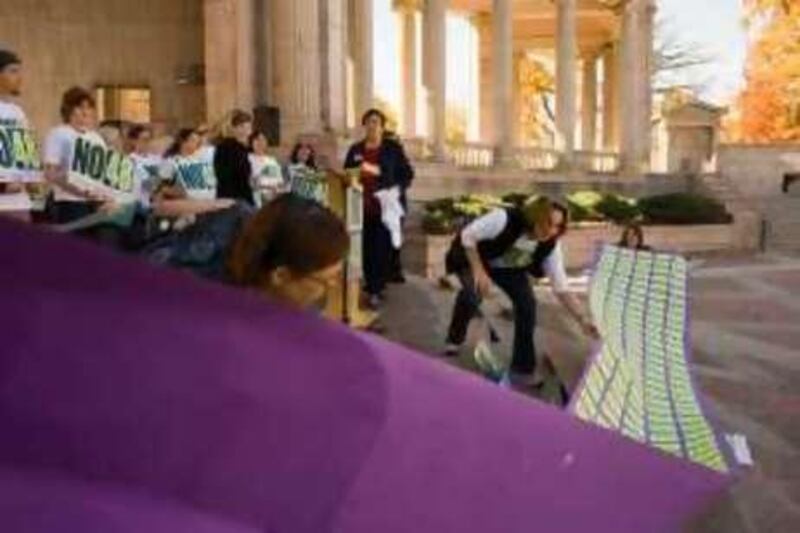DENVER // On the Colorado ballot, Amendment 48 sounds innocuous enough. It proposes to define "the term 'person' to include any human being from the moment of fertilisation". Yet the proposition, if it passes on Tuesday, could have profound effect on Colorado law - and perhaps beyond. "These 12 simple words have far-reaching consequences," said Leslie Durgin, the senior vice president for community development at Planned Parenthood, which opposes the bill. Amendment 48 would make abortion a form of murder in the Rocky Mountain state. Legal analysts say it might also outlaw certain forms of birth control, including the so-called "morning after pill" and intrauterine devices, or IUDs. Critics, who include the state's pro-life Catholic governor, Bill Ritter, say it could endanger the lives of women suffering dangerous pregnancies. And if taken before the US Supreme Court, it could even lead to the nationwide overturning of Roe vs Wade, the landmark 1973 legislation that made abortion legal. Amendment 48 could also affect how the census is taken, alter family law, inheritance rights and tort legislation governing accidental injury. "The word 'person' comes up in a voluminous number of laws," said Anne McGihon, a state representative. "It's hard to fathom all the implications this could have." The 21-year-old woman behind the proposed amendment said she expected the bill would raise controversy. Kristi Burton, who said she thought of the wording for the proposition while praying, believes it is time US citizens defined once and for all what the moment of conception really means. "Amendment 48 gives a different focus to the pro-life issue," Ms Burton said in an interview. "Instead of talking about how horrible abortion is, we are talking about defining what a human being is - about when life begins." Ms Burton and her fellow campaigners collected 130,000 signatures in churches and community centres, more than twice what was needed to put Amendment 48 on the Colorado ballot. Her opponents in the "No on 48" campaign describe the wording of the proposition as "dangerous and deceptive". They also doubt Ms Burton's claims of having thought up the idea in a moment of worship, noting that pro-life campaigners in other states, including Montana and Georgia, have previously tried and failed to pass so-called "personhood" laws with similar wording. A comparable proposition is currently on the ballot in South Dakota. It would outlaw abortion except in cases of incest, rape and pregnancies that threaten the life of the woman. But the Colorado proposition has pro-choice activists especially worried. Unlike most states, where a proposition must win the support of the state legislature, Colorado allows amendments on the ballot once its supporters gather enough signatures. If they vote to support it, it becomes state law. "They knew the threshold was lower here," said Laura Chapin, a spokesman for the No on 48 campaign. "That is why this is happening in Colorado." Activists trying to quash the amendment worry many Coloradans will not understand the vague wording when they get into the polling booth on Tuesday. In a sparsely attended rally last Tuesday in the capital, No on 48 activists tried to raise awareness about the bill's significance. "We must drive a stake through the heart of this extreme and dangerous legislation," Ms Chapin told the gathered crowd. Opponents of the proposition have published newspaper ads, planted posters in gardens across the state and held information sessions to teach Coloradans how Amendment 48 could play out. "This is a person," reads one newspaper ad, next to a photo of an egg. "No, it's a chicken." Just a few kilometres away from the Denver rally, an equally small and passionate group of volunteers stood on ladders outside the Denver Planned Parenthood clinic, shouting to women as they entered the facility. "Mom, don't go in there! We want to help you," called Jo Scott, who claimed that she has persuaded more than 60 women so far this year not to undergo abortions. "God says love your baby; don't kill it." Ms Scott, who has campaigned outside Planned Parenthood clinics five days a week since the 1980s, is a heroine of the pro-life movement. She and her supporters say clinics that practise abortion dehumanise unborn babies by referring to them as fertilised eggs. "When a woman wants a baby she calls it her baby, when she doesn't, they call it a fertilised egg," said Mike Winter, a fellow campaigner holding a graphic poster outside the Denver clinic. Early polls show a slim majority of Coloradans will reject Amendment 48, however, both sides of the campaign say the numbers are far too close to call before Tuesday. "We are now within a 15 per cent margin and closing," Ms Burton said. "I think we are doing pretty well." Her opponents are planning honk-ins and concerts to try and persuade Coloradans to vote down Amendment 48. Jo Scott said if that happens, she will carry on outside the Planned Parenthood clinic, trying to stop to pregnant women from walking through its imposing black gates. "I'm feeling confident," she said. "And if it passes, maybe I won't have to be here everyday any longer." gpeters@thenational.ae
Pro-lifers target vote in Colorado
On the Colorado ballot, Amendment 48 sounds innocuous enough - it proposes to define "the term 'person' to include any human being from the moment of fertilisation".

Editor's picks
More from the national





